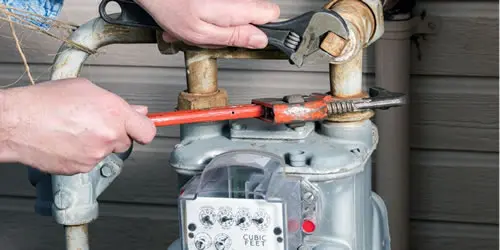1. Understanding Gas Line Plumbing
Gas lines transport natural gas or propane to various appliances and systems within a property. Proper maintenance and timely repair are essential to ensure the safe and efficient operation of gas systems. Gas line plumbing involves:
- Installation: Setting up gas lines for new appliances or systems.
- Maintenance: Regular checks to ensure gas lines are in good condition.
- Repair: Addressing leaks, blockages, or other issues with existing gas lines.
2. Common Gas Line Issues
a. Gas Leaks
Gas leaks are one of the most serious issues with gas lines. They can lead to explosions, fires, and health hazards. Signs of a gas leak include:
- Odor: A distinct sulfur or rotten egg smell added to natural gas for detection.
- Hissing Sound: A hissing noise near gas lines or appliances.
- Dead Vegetation: Plants around the gas line may die off due to gas exposure.
b. Blockages
Blockages in gas lines can impede the flow of gas to appliances, causing them to malfunction or operate inefficiently.
c. Corrosion
Over time, gas lines can corrode due to environmental factors, leading to weakened pipes and potential leaks.
d. Pressure Problems
Inconsistent or low gas pressure can affect the performance of gas-powered appliances and systems.
3. The Repair Process
a. Initial Inspection
A professional plumber will conduct a thorough inspection to identify the source and extent of the problem. This may involve:
- Visual Inspection: Checking for obvious signs of damage or leaks.
- Pressure Testing: Using specialized equipment to test for leaks or pressure issues.
- Leak Detection: Applying leak detection solutions or using electronic sensors.
b. Repair Methods
The specific repair method will depend on the issue:
- Leak Repairs: For minor leaks, plumbers may use patching materials or replace sections of the pipe. For major leaks, more extensive repairs or pipe replacements may be necessary.
- Clearing Blockages: Blockages can be cleared using various methods, including high-pressure water jets or pipe snakes.
- Replacing Corroded Pipes: Corroded pipes are replaced with new, durable materials to ensure safety and longevity.
- Adjusting Pressure: Pressure issues are addressed by adjusting regulators or fixing pressure-related components.
c. Testing and Verification
After repairs, the plumber will test the gas lines to ensure the issue has been resolved and that the system is functioning correctly:
- Leak Testing: Re-checking for any residual leaks.
- Pressure Testing: Ensuring that gas pressure is within the recommended range.
- Functional Testing: Verifying that gas-powered appliances and systems operate properly.
4. Safety Precautions
a. Turn Off Gas Supply
Before starting any repair work, it is crucial to turn off the gas supply to prevent accidents and ensure safety.
b. Ventilation
Ensure that the area is well-ventilated to disperse any gas that might have leaked or escaped.
c. Professional Assistance
Gas line repairs should only be performed by licensed and qualified professionals. They have the expertise and equipment to handle gas line issues safely and effectively.
d. Emergency Procedures
Know the emergency procedures in case of a gas leak or accident:
- Evacuate the Area: If you suspect a gas leak, evacuate the area immediately.
- Contact Authorities: Call emergency services and your gas provider for immediate assistance.
- Do Not Use Electronics: Avoid using electronic devices or creating sparks near a suspected leak.
5. Preventive Maintenance
Regular maintenance can help prevent gas line issues and ensure the safe operation of your system:
- Schedule Inspections: Regularly inspect and maintain gas lines and appliances to catch potential problems early.
- Monitor for Leaks: Be vigilant for any signs of leaks or other issues.
- Upgrade Components: Replace outdated or damaged gas line components to ensure safety and efficiency.
6. Choosing a Gas Line Plumbing Service
When selecting a plumbing service for gas line repair, consider the following:
- Licensing and Certification: Ensure the plumber is licensed and certified to work on gas lines.
- Experience: Look for a company with experience in handling gas line issues.
- Reputation: Check reviews and ask for recommendations to ensure reliability.
- Emergency Services: Choose a provider that offers emergency repair services for urgent situations.
Conclusion
Gas line plumbing repair is a critical aspect of maintaining a safe and functional gas system. By understanding common issues, repair processes, and safety precautions, you can ensure that your gas lines are in good condition and operate safely. Regular maintenance and timely repairs by qualified professionals will help protect your property and keep your gas-powered systems running smoothly.
By following this guide, you can make informed decisions about gas line repairs and ensure the safety and efficiency of your gas system.

